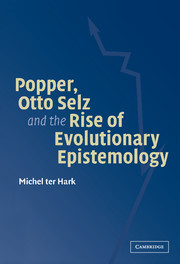Book contents
- Frontmatter
- Contents
- List of Illustrations
- Preface
- 1 Tracing the Genesis of an Idea
- 2 Psychology of Thinking, Evolutionary Theory, and Psychoanalysis
- 3 Popper and the Foundations of Pedagogy
- 4 Otto Selz and the Science of Problem Solving
- 5 Popper's Psychology of Knowledge
- 6 Evolutionary Epistemology and the Mind-Body Problem
- Notes
- Bibliography
- Index
4 - Otto Selz and the Science of Problem Solving
Published online by Cambridge University Press: 07 December 2009
- Frontmatter
- Contents
- List of Illustrations
- Preface
- 1 Tracing the Genesis of an Idea
- 2 Psychology of Thinking, Evolutionary Theory, and Psychoanalysis
- 3 Popper and the Foundations of Pedagogy
- 4 Otto Selz and the Science of Problem Solving
- 5 Popper's Psychology of Knowledge
- 6 Evolutionary Epistemology and the Mind-Body Problem
- Notes
- Bibliography
- Index
Summary
Life and work
Otto Selz lived much of his life in seclusion, cherishing the tranquillity he needed to develop his epistemological, psychological, and pedagogical ideas. Only a passport photograph has remained of him. In his scientific work Selz was increasingly marginalized owing to his unremitting criticism of colleagues but also to his formidably complex style of writing. An evolutionist disguised as an introspective psychologist, Selz came into conflict with proponents of the sciences of mind and culture, the Geisteswissenschaften, who blamed him for endorsing a mechanist view of man. Seeking to reconstruct psychological phenomena on the basis of their elements, Gestalt psychologists considered him an atomist, whereas to the school of Krüger he was a one-sided rationalist. Closely allied to the Würzburg school he did not shrink back from launching frontal attacks on the ideas of some of its members. Aside from one pupil, Julius Bahle, who closely collaborated with Selz, and the Dutch scholars Adriaan de Groot and Frans Prins, who applied his ideas in psychology and pedagogy respectively, he never founded a school, and after 1933 his name disappears almost completely from the German psychological literature. Yet there are excellent reasons for rescuing him from oblivion if only for his role – unbeknownst to him – in shaping the formation of another pupil: Karl Popper.
Selz was born on February 14, 1881, in Munich. His father, Sigmund Selz, was married to the Jewish Laura Wasserman, daughter of a rich vinegar factory owner.
- Type
- Chapter
- Information
- Popper, Otto Selz and the Rise Of Evolutionary Epistemology , pp. 87 - 114Publisher: Cambridge University PressPrint publication year: 2003



